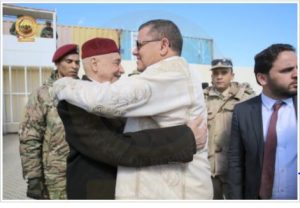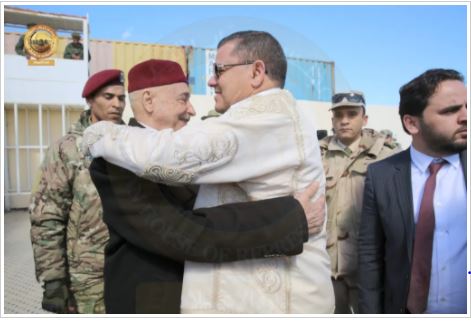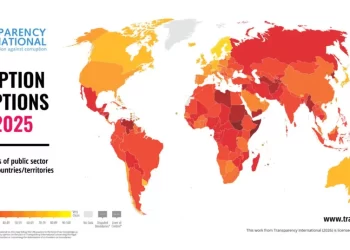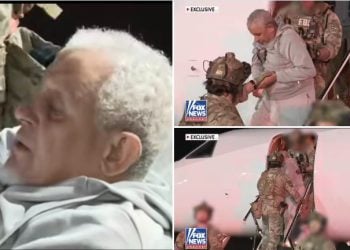By Sami Zaptia.

London, 20 February 2021:
The Government of National Unity (GNU) prime minister designate, Abd Alhamid Aldabaiba, met with House of Representatives (HoR) head, Ageela Saleh, at the HoR in Tobruk yesterday.
According to HoR Official Spokesperson, Abdalla Belheeg, Aldabaiba met with Second HoR Deputy head, Ehmid Huma, held several meetings with HoR members from all regions of Libya, east, west and south, as well as several sheikhs, notables and mayors of municipalities in the region.
Belheeg said that the meetings focused on the latest developments in the country, as well as the formation of the new GNU.
Analysis
Good vibes coming out of Tobruk?
It would have not passed Libya observers that the vibes coming out of Tobruk towards the prime minister designate of the new GNU were very positive.
The embrace between the HoR head Saleh and GNU prime minister designate Aldabaiba – an easterner and a westerner from Misrata – was something to observe. Yes, it could have been contrived, but the whole handshaking procedure was full of optimistic expectation. Those lined up to shake his hands looked eager to introduce themselves. By visiting them, Aldabaiba was acknowledging their existence and importance. They craved that. Previously, Tripoli ignored them, and vice versa.
Saleh’s smile was beaming across his face. He craved and got the political recognition he feels he is entitled to. He craves to be the head of a unified HoR, rather than a minority rump of 20-plus members – in contrast to the 97 who had met in Sabrata last week.
Salah lined up all his big guns to meet and greet Aldabaiba upon his arrival at the HoR Tobruk headquarters. This included municipality heads and tribal leaders. This was good for Aldabaiba. Eastern Libya is even more tribal than western Libya. Saleh could not have survived this long without local tribal and social support. Saleh bringing the social stakeholders to meet Aldabaiba is important for Saleh and Aldabaiba.
The whole occasion contrasts markedly with the frosty relations Saleh had with outgoing prime minister designate, Faiez Serraj.
Saleh and his HoR never endorsed Serraj and his government and that is why he and it are still ‘‘designate’’ and why Libya is still where it is politically today.
A dynamic vital to Libya’s future
The dynamic Aldabaiba creates with Saleh and his supporters is critical. Aldabaiba needs to tread carefully around Saleh. He needs to feed Saleh’s ego and acknowledge his ‘‘legitimacy’’ as the democratically elected and internationally recognized head of the HoR. But he needs to also allay his fears of ‘‘Islamists, extremists and militias’’ controlling Tripoli and its government and Central Bank of Libya controlled oil revenues.
But Saleh also wants to continue to be relevant in Libyan politics. Agreeing to and participating in the Libyan Political Dialogue Forum (LPDF) process means he has bought into it. It was unclear how he would react after losing the vote-off in Geneva, but it seems he is fully onboard.
Saleh wants to chair the Sirte meeting of a unified HoR called for by both blocs. Aldabaiba needs both blocs too. He needs them to meet with enough members to provide a legal quorum to endorse his GNU.
The hope is that, as a businessman, Aldabaiba is a dealmaker with little (known) ideological or political baggage. This, it is hoped will appeal to all sides. It is thought that it is this newness and unknown quality that partially contributed to him succeeding in the Geneva LPDF selection process. The process where his list beat Saleh’s list to victory.
Saleh to lose authority to LPDF
More importantly, if Aldabaiba succeeds in presenting his government to Saleh’s HoR within the LPDF stipulated 21 days but Saleh’s HoR fails to endorse within another 21 days, the endorsement process will revert to the 74 UNSMIL selected members of the LPDF. Saleh and his HoR would have lost (even more?) their authority and legitimacy. Endorsing Libya’s government was one of the main roles stipulated to it by the 2015 Skhirat Libyan Political Agreement (LPD). It is therefore believed that Saleh is actually very keen to endorse the GNU – rather than see the LPDF do it.
It is also an acknowledgement by Saleh that there is a change in the international political climate. Saleh could have been looking for a way out and Aldabaiba and the new winds could have provided that.
Aldabaiba visited Cairo before Saleh. He was met by Sisi as if he were already endorsed. That was a powerful signal to Saleh by Sisi, Saleh’s big ally. There is also a new U.S. President in the Whitehouse since January.
Effective government that pleases all political streams
Aldabaiba has to prove his political worth. He has to nominate a balanced government that will represent all of Libya’s regions and political streams, yet be effective in the remaining eight months of its reign before the 24 December elections.
It is a tricky task. But Libya has to believe that it can be done.








